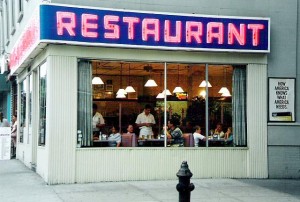 In one of the busiest industries in the world, it’s not a shock restaurant owners want to save money where they can, especially when it comes to doors and hardware. With such a fast-paced and busy schedule most restaurant owners operate on, it’s important the hardware that is used in their facility holds up for the standard period of time and the owners can get their money’s worth.
In one of the busiest industries in the world, it’s not a shock restaurant owners want to save money where they can, especially when it comes to doors and hardware. With such a fast-paced and busy schedule most restaurant owners operate on, it’s important the hardware that is used in their facility holds up for the standard period of time and the owners can get their money’s worth.
This edition of the LockNet Solution Center focuses on:
What kind of door do you recommend for a restaurant back door?
We have several suggestions to help you get the most out of your restaurant back door.
Chemical Resistant Doors
We recently discussed on the blog how the chemicals used in water softening systems can damage doors. In most restaurants, the water softening system is in the kitchen and more often than not, the kitchens are in located in the back of the restaurant.
Any sort of aluminum, galvanized steel or stainless steel door is resistant to chemicals. These are great options for back doors because they’re sturdy and can take a beating. They can also be washed down if chemicals do happen to spill on them.
Kick Plates
Carts, brooms, and shoes can be a nightmare for your restaurant back door if it isn’t protected. All of these things can leave unattractive scuff marks on your door.
This is where a kick plate comes in handy. Kick plates are exactly what they sound like—metal plates placed at the bottom of the door to keep the door protected. This is an inexpensive addition that can be added to most doors to keep your door in great shape for longer.
Detex EAX 500 Alarm
Restaurant managers often have problems with food disappearing and this usually happens out of the restaurant’s back door. If you don’t have an exit device with an alarm already installed, don’t worry. The Detex EAX 500 Alarm is a surface mounted alarm that can be placed on almost any door.
For it to work, the magnetic field between the frame and the door has to be broken. This will alert people that the back door has been opened. Because this is a simple solution and requires close to zero knowledge for installation, it a product we often recommend.
Door Closer
There’s nothing more annoying than a slamming back door, which is why a closer is so important. Closers help slow the door as it closes and, in turn, reduces not only the racket a slamming door causes, but possible damage to the door.
You could even go a step further and get a heavy-duty spring assisted dead stop to accompany your closer. This will help protect your closer. If the door should swing open—whether it be from wind or a reckless patron who got a little too rowdy with their exit—the dead stop will keep the door from swinging open to wide and damaging the closer itself.
These are just some of the possibilities for a restaurant back door. If you have more questions on any of the items listed above, we’d be more than happy to help.
